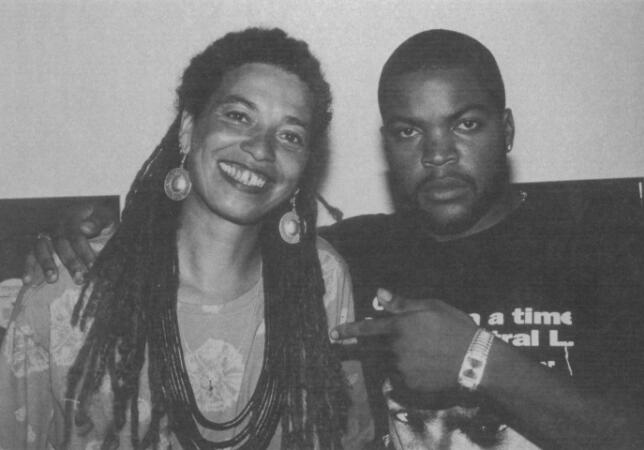
YouTube is a content goldmine; one can spend countless hours on the most popular video sharing site, where over 1 billion videos call home. Typically, I’m searching for something very specific, and after finding and watching whatever that is, another video recommended by YouTube catches my attention, and, curious, I watch a second video… and then a third, fourth, fifth, etc, and an hour later, I realize that I’ve deviated so far from what I initially searched for, and sometimes even forgotten what that was.
And that’s how I came across this video featuring Angela Davis interviewing Ice Cube – something I don’t believe I already knew (before today) actually happened. Of course I watched it. It’s very short, so they don’t cover much; the conversation we hear in the 3 minutes is mostly focused on Ice Cube’s growth from “AmeriKKKa’s Most Wanted” – his debut studio album – to “Death Certificate” – his second studio album released on October 29, 1991 by Priority Records.
As I learned after doing some digging, it’s a tiny piece of what was a 2-hour conversation between them, that took place at Ice Cube’s Street Knowledge business offices. Unfortunately, the full conversation doesn’t exist online (at least, I couldn’t find it; if you have better luck, let me know).
But thankfully, there’s a PDF transcript of it, which comes courtesy of Indiana University Press and W.E.B. Du Bois Institute. And it appears the interview took place in 1991, before the release of Ice Cube’s “Death Certificate.” So the 1992 date on the video itself isn’t correct; I suppose it could be that it aired in 1992.
Ice Cube’s publicist at the time, Leyla Turkkan, who thought the idea provocative, set up the interview, apparently hoping that it would position Ice Cube as “an inheritor of the Black radical tradition,” according to Hip-hop historian Jeff Chang (“Can’t Stop Won’t Stop: A History of the Hip-Hop Generation”). They both welcomed the interview, although neither had any idea of how the conversation would go. However, Davis was at a disadvantage from the start, because she wasn’t expertly familiar with Ice Cube and his music; but Cube certainly knew very well who she was. Davis writes in the transcript: “Considering the extremely problematic content of ‘Black Korea,’ I regret that I was then unaware of its inclusion on the album. My current political work involves the negotiation of cross-cultural alliances – especially among people of color – in developing opposition to hate violence. Had I been aware of this song, it would have certainly provided a thematic focus for a number of questions that unfortunately remain unexplored in this conversation.”
“Black Korea” would become the most controversial track on the “Death Certificate” album. In it, Cube threatens violence as a response to the preponderance of Korean grocery stores in black neighborhoods across the USA. The track was also seen as a reaction to the death of Latasha Harlins, a 15-year-old African American girl who was shot to death by a Korean store owner on March 16, 1991 in an altercation over a bottle of orange juice. The killer faced no prison time, beyond a fine and community service.
From the very start of the conversation between Davis and Cube, she underlines their “very different positions,” not only with regards to the content of Cube’s music, but also the gender and generational differences: “… you are a young man and I am a mature woman,” Davis states. But she also acknowledges what they do have in common.
I won’t spoil it for you, so first watch the 3-minute clip from the 2-hour interview below; and then read the full conversation transcript here.

